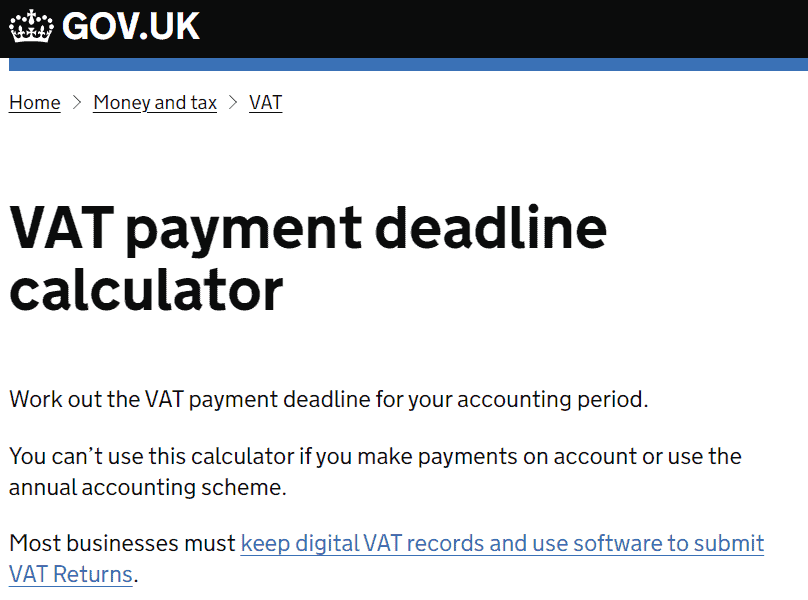Wondering when you have to make your VAT payments? Read on to find out.
What Is VAT And When Do I Have To Pay It?
VAT (Value Added Tax) is the amount you add to the price of your products and services that gets forwarded to HMRC. Being charged Value Added Tax is not the same as being charged on profits, as this money technically always belonged to HMRC. In other words, it was never part of your wider revenue.
Not all companies have to deal with VAT liability. Businesses that earn less than £85,000 per year do not have to become VAT-registered businesses.
However, if your company brings in more than £85,000 annually, you’ll have to make a VAT return to HMRC, either monthly or quarterly.
VAT Deadlines

Every company’s VAT deadline is different and depends entirely on when their VAT return period ends.
Both monthly and quarterly returns need to be made within one calendar month and seven days of the VAT return period.
For example, if your business’s VAT period ended on 31 March, you would have to make your VAT payment before 7 June.
Upon initially signing up for VAT, you will receive a VAT certificate within 14 days. This will detail your return periods.
If you’re unsure of when your VAT returns need to be made, you can log onto your VAT account. This will provide you with details of your next payment deadline, as well as whether or not your last VAT payment was received.
What Is The Annual Accounting Scheme?
There is one other way you can pay VAT: through an accounting scheme. This scheme allows you to only have one deadline for submitting VAT per year.
Instead of having to pay monthly, you pay the entirety of your VAT on this date. The VAT you need to pay is estimated from last year’s annual return. If you end up paying too much, it is possible to get a VAT refund.
This method is recommended for small businesses that struggle to keep on top of monthly or quarterly payments. It allows them to cut down on administrative costs and means they only have to worry about VAT once a year.
When is the deadline?
Just like regular VAT returns, this scheme also has a deadline. The due date is typically two months after the end of the accounting period.
How To Submit VAT Returns On Time
It’s worth noting that HMRC needs to have received all payments by the set deadline. Some methods of making VAT returns take several days, while others can be completed on the same day. So, this must be considered.
For example, CHAPS and online/telephone banking can ensure your VAT payments are completed on the same day. On the other hand, direct debit can take up to three days to complete.
Fines For A Late VAT Return
If you fail to meet a VAT period deadline, you may receive a surcharge.
If your company turns over less than £150,000, you won’t receive a surcharge for the first two defaults. On the third default, you’ll be charged a surcharge of 2% (if your earnings are less than £400). If you continue to fail to meet VAT return deadlines, you’ll be charged as follows:
- 4th default – 5% surcharge
- 5th default – 10% (or £30; whichever amount is higher)
- 6th default and above – 15% (or £30; again, whichever is higher)
However, if you earn more than £150,000, you will be charged more, starting with the 2nd default.
- 2nd default – 2%
- 3rd default – 5%
- 4th default – 10%
- 5th default and above – 15%
It’s also worth noting that you could be paid a fine worth 100% if your return is found to be inaccurate.
Final Thoughts
You can complete your VAT return online monthly, quarterly, or even annually. This can be done via direct debit or via telephone banking. However, you need to ensure that HMRC receives the payment before the return deadline to avoid fines.
To keep on top of your income tax and VAT, you should hire an accountant to help you make sense of it all.
Sources:
https://www.thefriendlyaccountants.co.uk/vat-deadlines-penalties/
https://marosavat.com/manual/vat/united-kingdom/returns/
https://informi.co.uk/finance/vat-deadlines-and-penalties?amp=true
https://www.plusaccounting.co.uk/knowledge/blog/when-are-vat-payments-due/